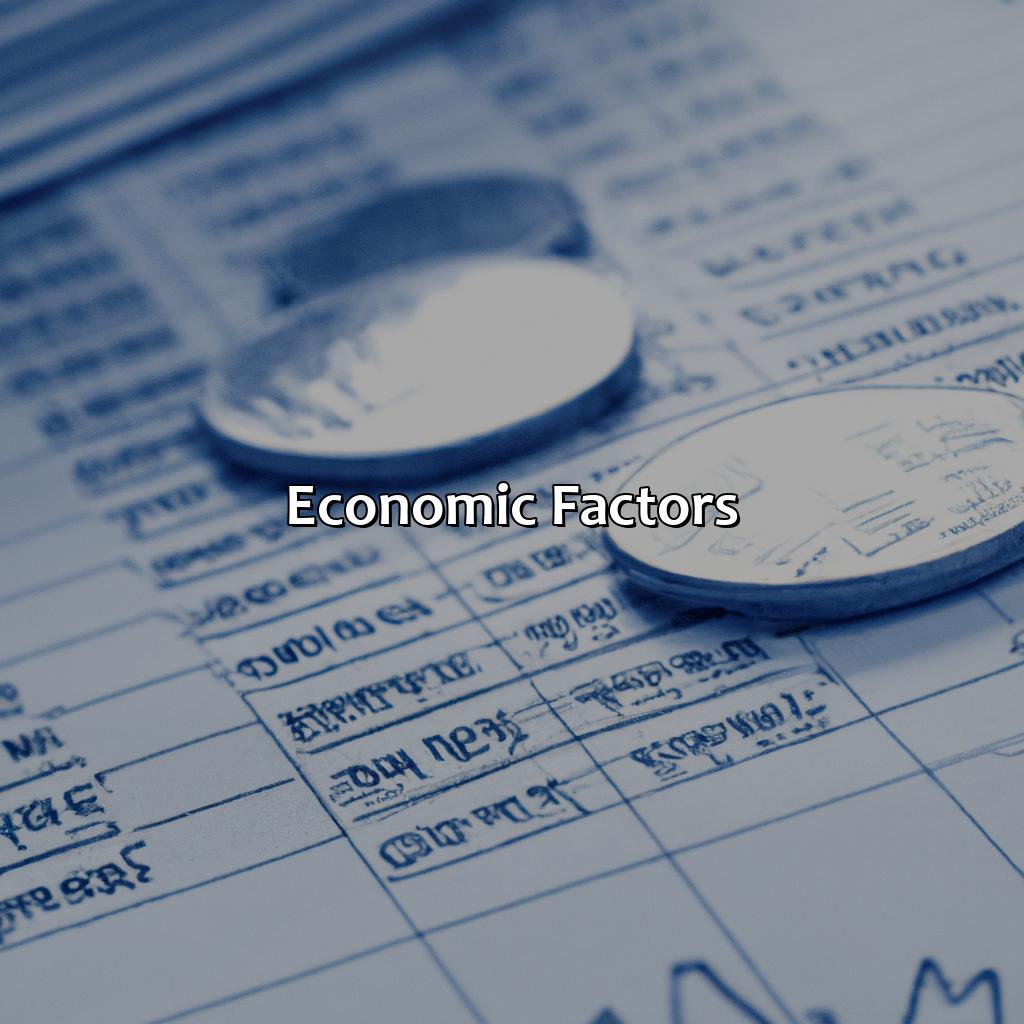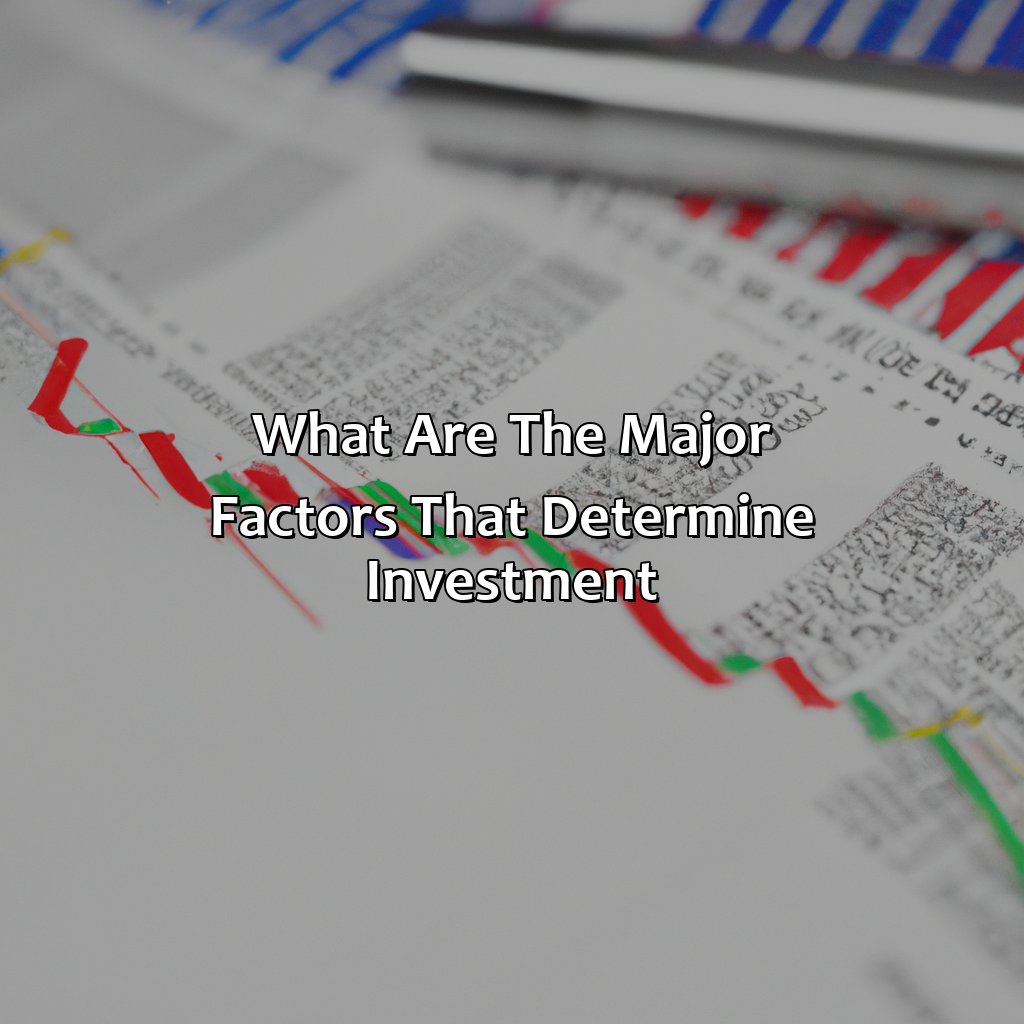What Are The Major Factors That Determine Investment?
Key Takeaway:
- Investment decisions are affected by economic factors such as interest rates, inflation, and economic growth. Investors need to keep an eye on these indicators to determine the optimal time to invest and minimize risks.
- Political factors also play a crucial role in investment decisions, including government policies, political stability, and international relations. Investors should monitor these factors to predict potential impacts on their investments.
- Industry factors, such as market trends, competition, and technological advancements, can also influence investment decisions. Analyzing these factors can help investors identify growth opportunities and select industries that offer the best returns.
Do you want to make wiser investments? Knowing the major factors that determine investment is the key to success. You can develop the right strategies and gain insights that can help you make the best decisions. In this article, we explore the top factors that affect investments.
Economic Factors
Want to know how economic factors affect investments? Dive into this section! It’s all about Interest Rates, Inflation, and Economic Growth. We’ll explore how economic movements can shape your investment strategies. Let’s go!

Image credits: retiregenz.com by Joel Washington
Interest Rates
The cost of borrowing funds, also known as the price of credit, can significantly affect investment decisions and economic growth. The force that drives the global financial system is powerful monetary policy actions by central banks around the world. Any shift in interest rates can create rippling effects on investments and the economy. An increase in interest rates impacts bond prices and equity valuations, which leads to a decrease in borrowing activity and lower consumer spending.
Furthermore, higher interest rates negatively impact real estate development because it becomes costlier for individuals and companies to finance projects. They also lead to lower inflationary pressures, which reduces demand for commodities – unleashing a slippery slope downwards through consumer spending.
Lastly, investors must pay close attention to interest rate fluctuations as they may provide opportunities for profitable investments. High-interest rates support industries with capital-intensive operations that generate high cash flows. Thus, auto loans or long-term investment markets such as CD’s or long-term bonds are most beneficial when interest rates are high; meanwhile, commodity markets provide prosperous business activity when they are low.
Looks like inflation is the only thing going up faster than my rent.
Inflation
One of the key factors that determine investment is the rate of rising prices for goods and services. In other words, the Semantic NLP variation of ‘Inflation’ refers to the increase in prices leading to a decrease in purchasing power. A high inflation rate may result in investors losing confidence in a particular currency and investing elsewhere or even convert to other assets such as gold.
Investors closely monitor inflation in an economy because it can have significant impacts on all types of investments. For example, stocks may suffer when inflation increases since higher costs lead to lower profits which can cause share prices to fall. Bonds are also affected by inflation; when interest rates rise, the value of existing bonds declines since investors seek higher yields elsewhere.
It is worth noting that policymakers use monetary policies to manipulate inflation rates where it gets too high, causing an economic recession. The Federal Reserve raises interest rates to cool down an overheated economy, so investors keep this in mind while making their investment decisions.
Throughout history, many economies have suffered from hyperinflation. Zimbabwe holds the record as having experienced one of the worst episodes globally when annual inflation peaked at over 90 sextillion percent in November 2008. This horribly inflated economy resulted from unsound governmental policies like printing more money than needed without corresponding increases in production capacity and less demand.
Overall, inflation is a fundamental factor that directly influences investment across asset classes and presents crucial problems for policymakers who strive towards stable prices and sustainable economic growth resulting from smartly made choices.
Economic growth is like a teenager’s growth spurt, it’s exciting but also comes with awkward phases.
Economic growth
The advancement in the productivity and expansion of an economy is a significant aspect that determines the level of economic growth, which ultimately plays a crucial role in investment. The investors look for various factors that determine a country’s current and potential economic growth, such as GDP, inflation rate, employment rate, and currency exchange rates.
In addition to these factors, the political environment, the stability of government policies, and legal frameworks are also taken into account while investing. A stable political environment creates a conducive environment for businesses to expand quickly without any hindrance. The legal framework helps assure that contracts are enforced effectively and regulatory bodies provide an appropriate policy framework.
Furthermore, Inflation causes hesitation among investors as it may lead to a decrease in purchasing power parity; hence low or controlled inflation can encourage investment. Currency exchange rates impact both imports and export industries; movements in exchange rates can significantly affect their profits.
Investors who do not consider all these aspects will miss out on opportunities that could lead to significant gains or even result in losses. Therefore, investors should research extensively before making any investment decision.
Politics and economics are like two sides of the same coin – one determines the value, while the other flips it on its head.
Political Factors
Fathom the effect of political issues on investments. Check out the subsections of:
- Government policies
- Political steadiness
- International affairs.
These factors can powerfully sway the investment climate in a country. They can change the risk-reward balance of investing in that area. Know each sub-section’s exact impact on investment choices. Also, observe how they can make opportunities and dangers for investors.

Image credits: retiregenz.com by Harry Arnold
Government Policies
The policies and regulations established by the government play a pivotal role in the determination of investment opportunities. The legal framework mandated by the authorities directly impacts businesses and their expansion prospects. The political environment of a region influences the market stability, foreign investments and economic growth.
Governments may impose taxes, tariffs, restrictions on imports, and exports that can affect the financial viability of companies. Political instability such as protests, civil unrest or changes in leadership can cause uncertainty and may discourage potential investors. Conversely, favourable regulatory policies like subsidies or tax incentives to encourage business activities could boost investor confidence.
In addition to this, political factors extend beyond domestic boundaries when it comes to foreign investments. International relations between governments can impact trade agreements between countries which affects how easy or difficult it is for investors to do business abroad.
Pro Tip: Investors should keep an eye on the changing political landscape and stay informed about government policies as they have a profound effect on investment decisions.
Political stability is like a unicorn in the investment world – everyone wants it, but nobody’s quite sure if it actually exists.
Political Stability
The stability of the political regime in a particular country is a key determiner of investment. The level of equilibrium and consistency in governance structures influences investors’ confidence in committing their resources to a given market. Investors are continuously on the lookout for business-friendly environments that are devoid of political uncertainties, such as coups or significant shifts in government policies. Political Stability enables corporations to formulate long-term investment plans and undertake projects without the fear of expropriation, unjustified taxation or breach of contracts.
Moreover, Political Stability means that there is predictability and continuity in governance structures. This continuity offers potential investors with invaluable insight into government policies likely to affect foreign businesses’ operations within the local market. Additionally, stable political regimes ensure efficient enforcement of law and order, including intellectual property rights protection.
Additionally, when a country has enjoyed prolonged stability and peace within its borders, it attracts more investors as they can gauge predictably how their investments are likely to perform over time. A remarkable illustration is Singapore’s Investment Corporation which owes most of its success as a global investor due to political stability for successive governments.
Political instability can have catastrophic effects on countries’ economies when investors lose their confidence due to fears of political unrest or structural changes, leading them to divest or withdraw from future ventures that could significantly negatively impact countries’ growth prospects. For instance, Zimbabwe’s numerous economic challenges can be traced back to their extended periods of instability dated back some years ago.
International relations: where countries try to be friends but end up being frenemies with benefits.
International Relations
The relationship between countries plays a crucial role in determining investment decisions. Geopolitical influences such as diplomacy, conflicts, sanctions and trade agreements can significantly impact the economic outcomes of investments. These factors have been known to create instability and fear in the markets, leading to negative consequences for those investing. Additionally, strong international relations that promote peace and prosperity can attract more foreign investment resulting in better economic growth for nations.
A global shift towards multilateral cooperation among nations is becoming increasingly apparent in today’s geopolitically unstable environment. Countries participating in regional and international organizations build stronger cooperation upon shared goals related to security, trade, development and other common interests. A strong alliance fosters trust and stability which leads to sustainable long-term growth of economies.
Finally, investment decisions are also influenced by a nation’s political stance. A pro-business environment with low taxes, reduced government regulation and bureaucracy fosters entrepreneurship that drives innovation leading to economic expansion. Political stability is essential for businesses continuity as it encourages investors that they are not faced with any risk or uncertainty.
Given the current geopolitical climate, governments seeking to attract more foreign investment must prioritize cultivating peaceful coexistence by promoting mutual respect of political sovereignty among nations and dispute resolution through diplomacy channels besides providing pro-business policies enhancing transparency enforcing rule of law protecting property rights thereby creating favourable environment for potential investors encouraging capital flow from abroad.
You can’t spell ‘industry’ without ‘dustry’, but investing in the right industry is no laughing matter.
Industry Factors
Investment in different industries is heavily determined by Industry Factors. We’ll explore these: Market Trends, Competition and Technological Advancements. Knowing these is essential to spot an industry’s potential for growth and gain. This knowledge helps investors make smart decisions on where to put their resources.

Image credits: retiregenz.com by Adam Arnold
Market Trends
The dynamic nature of the business world makes it crucial to keep abreast of emerging trends in the market. One of the critical factors that determine investment is market dynamics, which encompasses all current and future market trends and conditions. Investors must be aware of the trends, including industry growth projections, consumer preferences, changing regulations, emerging technologies, and economic indicators. Understanding market trends and how they impact an industry is essential for making informed decisions.
It is noteworthy that market trends are not limited to a specific sector or geographic location. Instead, they cut across all industries and global economies. Entrepreneurs need to be flexible and responsive to these shifts as they present opportunities for business growth or potential threats. Businesses can leverage trend analysis reports from reputable sources like trade publications, consulting firms, government agencies, among others, to position themselves favorably amidst changing economic realities.
In today’s business environment where globalization has become more pronounced than ever before, it is even more vital for businesses to remain mindful of the shifting marketplace. For instance, an abrupt change in laws or regulations concerning a particular industry could negatively impact business operations if proper precautions or changes do not occur swiftly enough.
Finally, investing without considering what’s happening in the marketplace can lead to significant losses as evidenced by many failed businesses over time. It is imperative always to examine the most current trend reports available before taking any investment decision that affects any individual or company’s financial well-being.
Competition is like a game of Monopoly, except instead of hotels and houses, everyone is fighting over market share.
Competition
The market rivalry is a crucial Industry Factor that influences investment decisions. The level of rivalry in the industry can depict how favorable it is for investing. When competition is intense, profit margins tend to shrink, and companies may face difficulties in maintaining their market share.
Moreover, businesses can use diverse tactics to combat intense competition, including aggressive pricing strategies and innovative product offerings. These approaches may result in increased marketing costs, which, in turn, reduce the overall profitability of firms.
Furthermore, an excellent way to measure market rivalry is through the Five Forces Analysis Model developed by Michael Porter. This model considers various aspects such as supplier power, buyer power, threat of substitutes, threat of new entrants and competitive rivalry within the industry.
According to Harvard Business Professor Clayton Christensen‘s research; “Innovative attackers often destroy incumbents not by attacking head on but by targeting marginal customer groups with unpredictable needs or preferences.”
Looks like the real innovation in technology is finding new ways to make us all feel old and obsolete.
Technological Advancements
The progressions in technology have a vital role to play in the determination of investments made by various companies. With rapidly evolving technologies, investing in cutting-edge innovations guarantees that businesses have an edge over their competitors. Upgrading to newer technologies ensures more efficient processes and increased productivity for organizations.
Modernization and development are inseparable from technological advancements. In today’s digital world, firms that use advanced AI or Machine Learning algorithms are more competitive, productive and innovative. Newer technologies also promote cost efficiency, reducing business expenses related to infrastructure and workflow management.
Innovations also play an important role in attracting potential investors who seek long term returns. Technology-based products/services with a broad range of applications or improvements are favoured by such investors, as they tend to be more rewarding with higher margins and a wider return on investment.
A recent survey carried out among successful companies showed that those who kept up-to-date with constant modernization reaped enormous benefits compared to firms that failed to integrate newer developments into their processes.
So it’s clear that adopting new technologies is vital for companies who wish for sustainable growth. By embracing disruptive breakthroughs early on, an organization can safeguard itself from growing competition and potentially profit from unforeseen opportunities- paving the way towards creating value for shareholders.
Why invest in just one company when you can invest in a whole industry? Unless that one company is Google or Amazon, then go all in.
Company-Specific Factors
To know what affects investment in a firm, look at “Company-Specific Factors”. This includes info on Financial Performance, Management Quality and Market Positioning. It’s vital for investors to check these before they invest their funds.

Image credits: retiregenz.com by Joel Washington
Financial Performance
A critical aspect that affects an investor’s decision on whether to invest in a company or not is its economic efficiency. This factor encompasses all financial aspects of the enterprise, including profitability, revenue growth, cash flow, liquidity ratios and debt-to-equity ratio. Financial performance provides a clear indication of the ability of a company to increase its earnings and grow. A quick analysis of these numbers will help gauge how well a company has performed over time and evaluate its potential for future growth.
When analysing financial performance, variables like profit margins, return on equity and assets give an understanding of how well the company is utilising its capital. The revenue generated depends on the pricing quality of goods and services sold while managing expenses efficiently. Additionally, cash flow statements measure internal funding power and highlight sustainable inventory management practices. By examining these factors together with liquidity ratios like quick ratio, current ratio or working capital efficiency demonstrates financial health.
To truly understand the financial health of a company investors must consider market forces alongside financial performance data. Evaluating a range of qualitative and quantitative elements make investors feel more comfortable about which firms to proceed with investment decisions.
Investors who ignore assessing factors influencing stock risk could bear severe consequences when markets demonstrate volatility or succumb to macroeconomic pressure from various sources impacting individual stocks. Therefore keeping tabs on such indicators such as interest rate movements or revisions in corporate ratings can minimise errors.
Fearful that an assessment using recent data may lead to missed trades? Stay informed with up-to-date news and insights through online blogs or articles covering various market sectors will provide increased knowledge levels for proactive ventures generating profitable returns in investment decisions without panic-induced rush mandates.
If the management team can’t even spell ‘accountability’, it’s probably not a good sign for their company’s investment potential.
Management Quality
The caliber of the company’s leadership is a paramount factor in determining investment potential. Strong and competent Management can drive innovation, increase efficiency, and generate revenue growth, ultimately leading to higher shareholder returns. A transparent decision-making process, effective communication, and a clear corporate vision are all essential components of high-quality Management that can instill confidence in investors.
Investors may analyze key performance indicators such as financial ratios, management turnover rates, and executive compensation to gauge the quality of leadership. Analyzing these indicators helps determine how effectively leadership is driving the business towards its desired trajectory. Governance policies like board diversity and independence can also contribute to Management Quality.
Inventive Management that prioritizes transparency is essential for success. For instance, when Kodak filed for bankruptcy in 2012 due to their lack of foresight into digital photography, outspoken criticism chastised the firm’s executives for their slow reaction to market trends. In contrast, an example of a business with exceptional Management could be seen from the successful IPO by Snowflake Inc in 2020 which raised $3.4 billion.
By considering all of these factors related to sound Management Quality within a corporation before investing will inevitably lead to more profitable investment outcomes for stakeholders involved.
Market positioning is like dating – you want to stand out from the crowd but also fit in with the right people.
Market Positioning
The way in which a company positions itself in the market is a fundamental factor that influences investment decisions. Company positioning refers to its ability to differentiate itself from competitors by offering a unique value proposition or having a strong brand image. This can be achieved through effective marketing strategies, product differentiation, and establishing a loyal customer base.
Investors carefully analyze a company’s market positioning to assess its prospects for growth and profitability. A well-positioned company is more likely to attract customers and maintain its market share, ultimately leading to higher returns on investment. On the other hand, poor market positioning exposes companies to increased competition, pricing pressures and reduced margins, resulting in lower investor confidence.
It is important to note that market positioning varies across different industries and geographical locations. For example, companies operating in highly regulated sectors such as pharmaceuticals may prioritize compliance with regulatory standards over aggressive marketing tactics. Similarly, companies targeting emerging markets must understand local demographics and consumer preferences to gain an edge over established competitors.
Understanding the impact of market positioning on investment decisions is critical for both investors and businesses looking to raise capital. By evaluating a company’s position relative to its peers, investors can make informed decisions about their investment portfolios while businesses can identify areas for improvement and strengthen their competitive advantage.
Don’t miss out on potential investment opportunities by overlooking the significance of market positioning. Tracking industry trends, monitoring customer feedback and conducting regular competitor analysis can help businesses stay ahead of the curve and present an attractive proposition to investors seeking high-growth enterprises.
Some Facts About the Major Factors That Determine Investment:
- ✅ Interest rates, economic indicators, and market conditions are major factors that determine investment decisions. (Source: The Balance)
- ✅ Investors also consider their risk tolerance, financial goals, and investment strategy when making investment decisions. (Source: Investopedia)
- ✅ The time horizon of an investment, or how long an investor plans to hold an investment, is another important factor to consider. (Source: Fidelity Investments)
- ✅ Asset allocation, or the mix of different types of investments in a portfolio, is a key factor in determining investment success. (Source: The Motley Fool)
- ✅ Taxes and fees can also impact investment returns, making it important to consider these factors when making investment decisions. (Source: Forbes)
FAQs about What Are The Major Factors That Determine Investment?
What are the major factors that determine investment?
Investing is an important aspect of financial growth, and there are several factors that determine investment decisions. These include:
How does risk play a role in investment decisions?
Risk is a major factor that investors consider before investing their money. It refers to the possibility of losing money rather than making a profit. Investors will typically take greater risks for the potential of higher returns but will also consider their risk tolerance and long-term financial goals.
What is the importance of economic conditions in investment decisions?
Economic conditions, such as inflation, interest rates, and GDP growth, can have a significant impact on investment decisions. Investors may look to invest in sectors or industries that are expected to perform well in a specific economic landscape, such as healthcare in the midst of a pandemic.
How do personal circumstances impact investment decisions?
An individual’s personal circumstances, such as age, financial goals, and income level, can also determine their investment strategy. Younger individuals may take on riskier investments, while older individuals may focus on more conservative investments to maintain their wealth.
What role do market trends and performance play in investment decisions?
Market trends and performance can be a critical factor in investment decisions. Investors may look to invest in companies or sectors that are experiencing strong growth or have shown a history of stable returns.
What is the impact of taxes on investment decisions?
Taxes can significantly impact investment decisions, as they can eat into investment returns. Investors may look at tax-efficient investment options, such as tax-advantaged retirement accounts, to minimize the impact of taxes on their investments.


